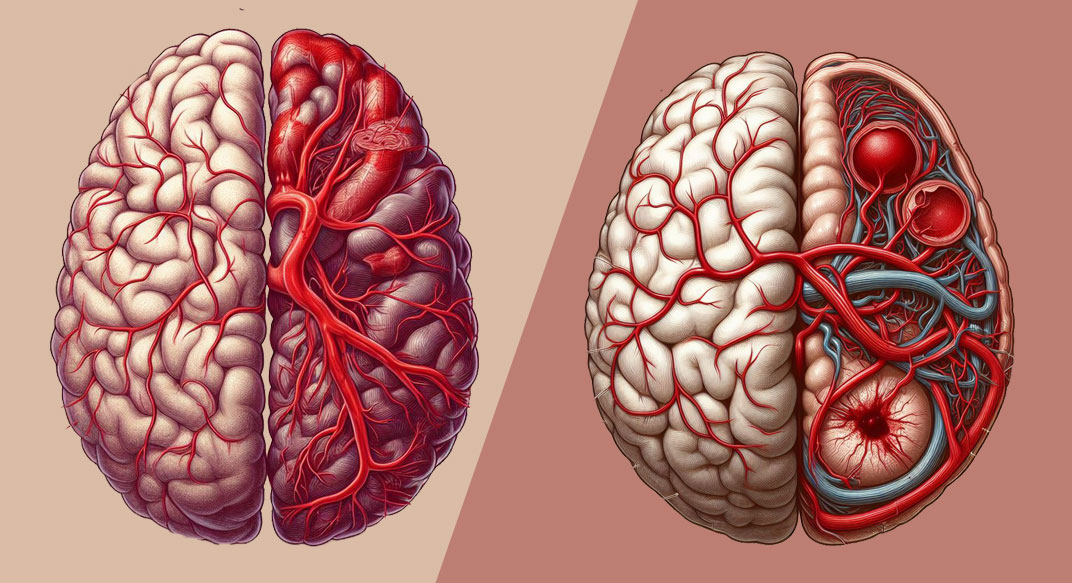Understanding Brain Stroke: Causes, Symptoms, and Treatment

A brain stroke, also known as a cerebrovascular accident (CVA), is a medical emergency that occurs when blood flow to the brain is disrupted, leading to damage or death of brain cells. As a neurosurgical website dedicated to providing valuable information, we aim to shed light on this critical condition, including its causes, symptoms, and treatment options.
Causes of Brain Stroke:
Brain strokes typically occur due to one of two main causes or two types of brain strokes:
Ischemic Stroke:
This kind of stroke happens when a blood clot or a buildup of plaque blocks a blood vessel that carries blood to the brain. This blockage stops oxygen and nutrients from reaching the brain tissue. Ischemic strokes are the most common type of stroke.
Hemorrhagic Stroke:
A hemorrhagic stroke occurs when a blood vessel in the brain ruptures, causing bleeding into the surrounding brain tissue. This can result from conditions such as high blood pressure, aneurysms, or arteriovenous malformations (AVMs).
Symptoms of Brain Stroke:
Recognizing the signs of a stroke is crucial for prompt medical intervention. Common symptoms of a brain stroke include:
- Sudden numbness or weakness in the face, arm, or leg, especially on one side of the body
- Difficulty speaking or understanding speech
- Confusion, trouble with vision, or sudden trouble walking or loss of balance
- Severe headache with no known cause
It's essential to remember the acronym FAST when assessing for stroke symptoms:
- Face drooping
- Arm weakness
- Speech difficulty
- Time to call emergency services
Diagnose of Brain Stroke:
- The first step is a physical examination conducted by a doctor to identify any neurological deficits, which will guide further tests.
- CT Scans are the primary imaging tests available and are very effective in detecting Hemorrhagic stroke. CT angiography can also be done to identify the cause of the stroke
- MRI is the most powerful imaging test for a stroke and is the preferred option for diagnosis. It provides complete details regarding the stroke.
- Carotid ultrasound is done for Ischemic stroke to identify any fat plaque in neck vessels.
- ECG tests and 2D ECHO are also conducted to detect any irregular heartbeats which may have caused the stroke
Treatment Options for Brain Stroke:
Immediate treatment is critical for improving outcomes in stroke patients. Depending on the type and severity of the stroke, treatment options may include:
Mechanical Thrombectomy:In some cases of large vessel occlusion ischemic strokes, a neurosurgeon may perform a mechanical thrombectomy procedure to remove the clot using specialized devices.
Surgery:For hemorrhagic strokes, surgical intervention may be necessary to repair damaged blood vessels or remove excess blood from the brain.
Clot-Busting Medications:For ischemic strokes, thrombolytic medications such as tissue plasminogen activator (tPA) may be administered to dissolve blood clots and restore blood flow to the brain.
Rehabilitation: Following the acute phase of treatment, stroke patients often require rehabilitation therapy to regain lost functions and improve quality of life.
Prevention of Brain Stroke:
While some risk factors for stroke, such as age and family history, cannot be controlled, there are steps individuals can take to reduce their risk:
- Maintain a healthy lifestyle, including regular exercise and a balanced diet low in saturated fats and cholesterol.
- Manage chronic conditions such as high blood pressure, diabetes, and atrial fibrillation through medication and lifestyle modifications
- Avoid smoking and excessive alcohol consumption.
- Be proactive in seeking medical attention for conditions that increase stroke risk, such as carotid artery disease or transient ischemic attacks (TIAs).
In conclusion, brain strokes are serious medical emergencies that require immediate attention. By understanding the causes, recognizing symptoms, and knowing the available treatment options, individuals can take proactive steps to mitigate their risk and improve outcomes in the event of a stroke. If you or someone you know experiences symptoms of a stroke, don't hesitate to seek medical help immediately. Your brain health is too important to ignore.
For personalized advice and consultation on any brain and spine-related concerns, it is strongly recommended to seek the expertise of a qualified medical professional. We encourage you to consult with Dr. Adarsh Patel, a best neurosurgeon in ahmedabad for their expertise in addressing various neurological and spinal conditions. Dr. Adarsh Patel possesses a wealth of experience and is committed to providing comprehensive and individualized care to patients. To schedule an appointment or seek further guidance, please contact Dr. Adarsh Patel directly Click Here. Your health is of utmost importance, and consulting with a specialist ensures that you receive accurate information tailored to your specific needs.
To Know more about Pituitary Adenoma: Symptoms, Causes, Risk Factors, and Treatment: Read More
Understanding Subdural Hematoma: Causes, Symptoms, Treatment, and Prevention: Read More
Read all articles realted to brain and spine problems: Read More
Disclaimer: The information provided in this article is for general informational purposes only and is not intended as, nor should it be considered, a substitute for professional medical advice. Do not use the information on this website for diagnosing or treating any medical or health condition. If you have or suspect you have a medical problem, promptly contact your professional healthcare provider.
